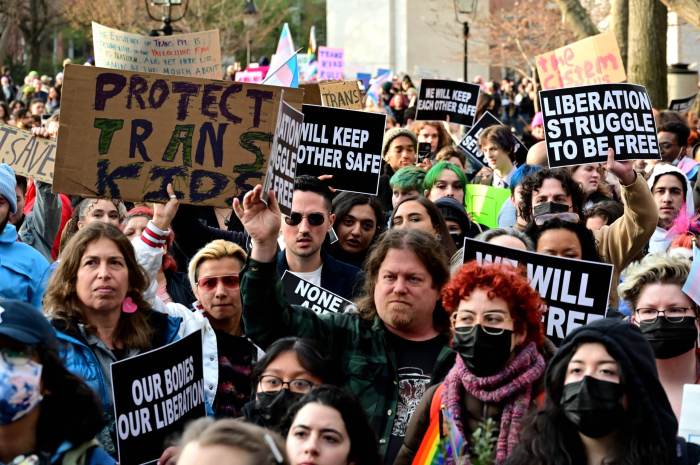BY PAUL SCHINDLER | When news surfaced last Friday that former North Carolina Senator Jesse Helms had died at 86, there was ample reason to remember that man's many evil deeds, and fortunately a good number of people spoke up about them.
“Jesse Helms' legacy is one of hatred, homophobia, and racism,” Joe Solmonese, the president of the Human Rights Campaign, said in a written statement.
Among his many insidious opinions, what one observer termed Helms' “bundle of prejudices,” antipathy to African Americans and hatred of gay people surely stood out.
Segregation and its defense represented the cornerstone of Helms' early public life as an advisor to politicians scrambling to shore up the South's crumbling Jim Crow order. He abandoned the Democratic Party just as Richard Nixon's infamous “Southern strategy” for the GOP was taking flight. In the '80s, he led the Senate opposition to making Martin Luther King's birthday a federal holiday, citing the slain civil rights leader's ties to Communists.
Carol Moseley-Braun, the former African-American senator from Illinois, said that Helms once got on a Sen-ate elevator, began whistling “Dixie,” and vowed to continue until she cried. His two Senate runs against Harvey Gantt, the African-American former mayor of Charlotte, in 1990 and 1996, were fueled by racial resentments, though the Democrat's support of gay rights made him a target of baiting on that score as well.
Fact-checking to my satisfaction all the racially inflammatory comments attributed to Helms on the Internet during the past several days wasn't possible, though I have little doubt that most or all were accurate. Let's leave it to David Broder, the dean of old-school Washington political reporting, to sum up Helms' record on race. Calling him ” the last prominent unabashed white racist politician in this country,” Broder, at the time of the senator's retirement in 2002, wrote, “What is unique about Helms – and from my viewpoint, unforgivable – is his willingness to pick at the scab of the great wound of American history, the legacy of slavery and segregation, and to inflame racial resentment against African Americans.”
Helms' savage attacks on the gay community were often served up as part of his pursuit of ignorant AIDS policies. During a debate over an AIDS bill that enjoyed bipartisan support from Massachusetts' Ted Kennedy and Utah's Orrin Hatch, Helms said, “There is not one single case of AIDS in this country that cannot be traced in origin to sodomy.” And he also said, “I hate to use the word gay in connection with sodomy.
There's nothing gay about these people,” a group, he said, whose “deliberate, disgusting, revolting conduct… is responsible for the disease.” As late as 1995, Helms would publicly claim, “Homosexuals are weak, morally sick wretches.”
Helms' hysteria about AIDS led to one of the most reprehensible public health policies ever enacted by this nation – the ban on immigration or even ordinary travel into this country by people living with HIV. Despite solid opposition from every reputable scientific and medical association around the world, the policy has remained in place since 1987.
Andrew Sullivan, the HIV-positive gay blogger who has a conservative's reverence for tradition, this week wrote, “I'm pretty firm about always respecting the dead. But since he spent his life doing all he could to make my gay brothers and sisters marginalized, hated, and dead, it is hard to feel what a Christian should. And since he was personally responsible for removing my right to become an American, and his legacy of hatred toward those struggling with HIV is still alive, forgive me for finding forgiveness hard.”
Anger toward Helms from AIDS activists spilled over into one of the most audacious demonstrations from ACT UP's heyday, when seven members of a splinter group, the Treatment Action Guerillas (later the Treatment Action Group), arrived at Helms' home, armed with a giant condom and a cold-air blower and proceeded to sheath the residence in the prophylaxis which carried large lettering that read, “A condom to stop unsafe politics. Helms is deadlier than a virus.” Check out a video clip at http://youtube.com/watch?v=bngtgTwvKcE.
Helms also waged a war on homo art. Tim Miller, the queer performance artist who gained notoriety in 1990 as one of the NEA 4 stripped of National Endowment of the Arts funding under political pressure from the White House of George H.W. Bush, described Helms as putting “the cattle prod” to his congressional colleagues to force a “decency clause” into the NEA appropriations law. Though several lower courts found the restriction unconstitutional, the Supreme Court, in 1998, sided with Helms' Know-Nothingism.
Helms, of course, was notorious throughout his career on many other fronts. His rabid anti-Communism, for example, made him a soulmate to right-wing terrorists, including General Augusto Pinochet, Chile's dictator, the Nicaraguan Contras, the UNITA rebels in Angola, and the white racist RENAMO guerrillas in Mozambique.
But, my clearest recollection about Helms is from the 1996 Democratic convention in Chicago. There I met Patsy Clarke and Eloise Vaughn, two North Carolinians who had lost their sons to AIDS and later formed MAJIC, Mothers Against Jesse in Congress. They were in Chicago to support Gantt's second run for the Senate, which he would lose three months later in the face of fierce racial and gay-baiting by Helms' reelection drive.
Clarke explained that her late husband had once been an adviser to Helms and that when her son Mark died she had written to the senator, asking for his support for AIDS research and that he not pass judgment on those living with the virus.
Helms wrote back, saying, “As for homosexuality, the Bible judges it, I do not.”
He added, “As for Mark, I wish he had not played Russian roulette with his sexual activity.”

































